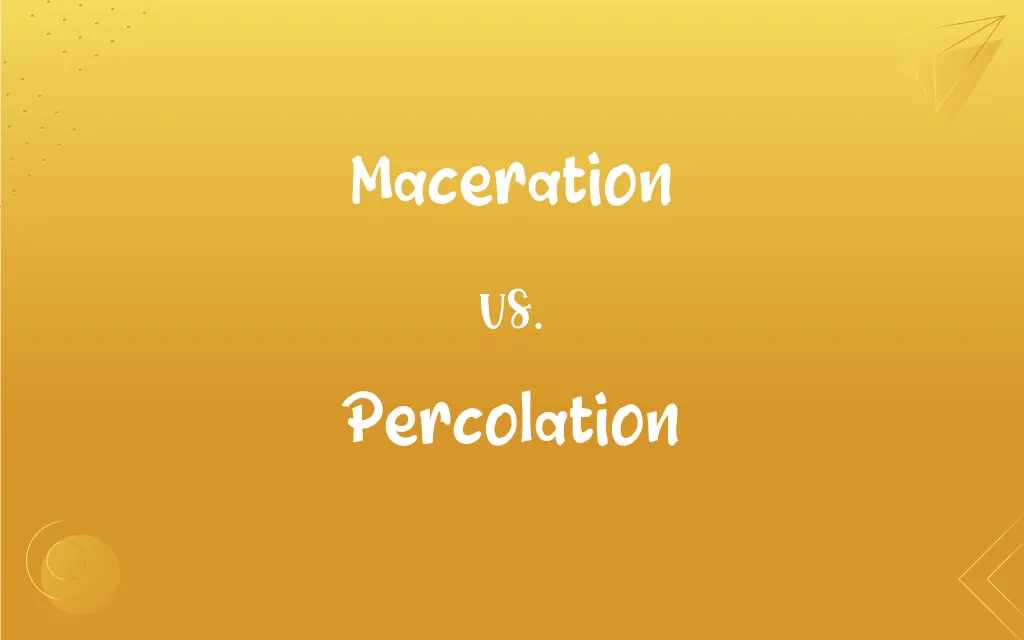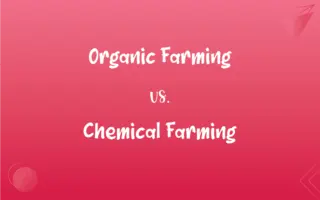Maceration vs. Percolation: What's the Difference?
Edited by Janet White || By Harlon Moss || Updated on October 21, 2023
Maceration involves soaking materials to soften or break them down; percolation is the process of a liquid passing through a porous substance.

Key Differences
Maceration and percolation are two distinct methods used in the extraction of soluble substances. While maceration involves soaking a substance to soften or break it down, percolation refers to the movement of a liquid through a porous substance, often to extract specific compounds.
In the context of herbal extraction, maceration often entails soaking plant materials in a solvent like water or alcohol. On the other hand, percolation involves pouring a solvent over the plant material, allowing it to trickle through and extract desired compounds.
Maceration is a simpler process, typically requiring just a container for soaking. Percolation, however, necessitates specific apparatus, like a percolator, to facilitate the flow of solvent through the material.
Duration also differentiates these methods. Maceration might require an extended period, from hours to weeks, to achieve optimal extraction. In contrast, percolation can often yield results in a shorter timeframe.
The outcomes also vary between maceration and percolation. While maceration might yield thicker extracts or pulps, percolation often results in clearer solutions as the liquid effectively filters through the material.
ADVERTISEMENT
Comparison Chart
Process Description
Soaking materials to soften or break them down.
Liquid passing through a porous substance.
Equipment
Simple container for soaking.
Specific apparatus like a percolator.
Duration
Can range from hours to weeks.
Often quicker, depending on material and solvent.
Outcome
May yield thicker extracts or pulps.
Usually results in clearer solutions.
Primary Use
Extraction by soaking in a solvent.
Extraction by filtering a solvent through material.
ADVERTISEMENT
Maceration and Percolation Definitions
Maceration
Breakdown of a material by immersion.
The tissue showed signs of maceration after prolonged water exposure.
Percolation
Movement of fluid through interstices.
Percolation in sandy soils happens rapidly compared to clay soils.
Maceration
Softening by soaking in a liquid.
The berries underwent maceration to enhance their flavor.
Percolation
A technique in brewing coffee.
The percolation process gives the coffee its rich flavor.
Maceration
A technique to extract flavors or compounds.
Wine-making often involves grape maceration to release its juices.
Percolation
A concept in physics and network theory.
The scientist studied percolation thresholds in the material.
Maceration
Prolonged wetness leading to tissue decomposition.
The wound suffered from maceration due to inadequate dressing.
Percolation
The act of a liquid filtering through a porous substance.
Groundwater results from the percolation of rainwater.
Maceration
A method used in herbal medicine preparation.
The herbs underwent maceration to produce a potent tincture.
Percolation
A method to extract soluble substances.
The chemist used percolation to obtain the desired compound.
Maceration
To make soft by soaking or steeping in a liquid.
Percolation
To cause (liquid, for example) to pass through a porous substance or small holes; filter.
FAQs
How does percolation work?
Percolation involves a liquid passing through a porous substance to extract or filter.
Which method requires a specific apparatus?
Percolation typically requires a specific apparatus like a percolator.
What is the primary process of maceration?
Maceration involves soaking materials in a liquid to soften or extract compounds.
How clear are solutions from percolation?
Percolation often results in clearer solutions due to the filtering nature of the process.
How long does maceration usually take?
Maceration can range from hours to weeks, depending on the material and purpose.
Is percolation a quick process?
Percolation can be quicker than maceration, but it varies based on the material and solvent.
Can percolation occur naturally?
Yes, percolation can occur naturally, such as when rainwater filters through soil.
How do you prevent tissue maceration?
Preventing prolonged exposure to moisture and using appropriate dressings can prevent tissue maceration.
What is a common equipment used in maceration?
A simple container for soaking is commonly used in maceration.
Are there industrial applications for percolation?
Yes, percolation is used in various industries for processes like water purification and chemical extraction.
What is a common outcome of maceration?
Maceration often yields thicker extracts or pulps.
Can maceration be used in winemaking?
Yes, maceration is used in winemaking, often to extract flavors from grapes.
Is coffee brewing a type of percolation?
Yes, certain coffee brewing methods use percolation to extract flavors from coffee grounds.
Are maceration and percolation used in herbal medicine?
Yes, both methods can be used in herbal medicine for extracting compounds from herbs.
Is percolation relevant in physics?
Yes, percolation is a concept in physics and network theory, especially concerning material properties.
What happens during the maceration of fruit?
During fruit maceration, the fruit softens, and its flavors and juices are extracted.
How does percolation affect soil?
Percolation involves water moving through soil, affecting moisture levels and groundwater recharge.
Which method produces a clearer extract?
Percolation usually produces a clearer extract compared to maceration.
Can maceration cause skin issues?
Yes, prolonged wetness can lead to skin maceration, causing it to soften and break down.
Do both methods require the same solvent?
Not necessarily. The choice of solvent varies based on the desired extraction outcome for both maceration and percolation.
About Author
Written by
Harlon MossHarlon is a seasoned quality moderator and accomplished content writer for Difference Wiki. An alumnus of the prestigious University of California, he earned his degree in Computer Science. Leveraging his academic background, Harlon brings a meticulous and informed perspective to his work, ensuring content accuracy and excellence.
Edited by
Janet WhiteJanet White has been an esteemed writer and blogger for Difference Wiki. Holding a Master's degree in Science and Medical Journalism from the prestigious Boston University, she has consistently demonstrated her expertise and passion for her field. When she's not immersed in her work, Janet relishes her time exercising, delving into a good book, and cherishing moments with friends and family.































































